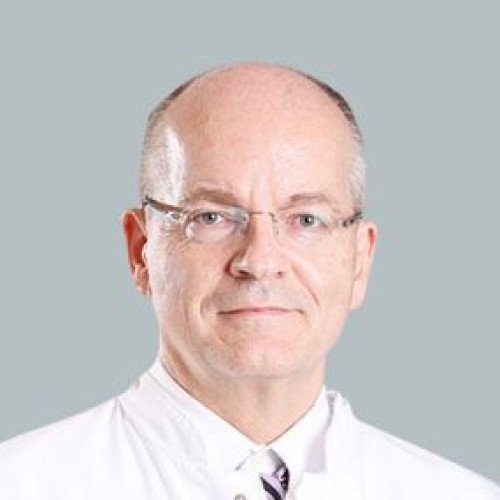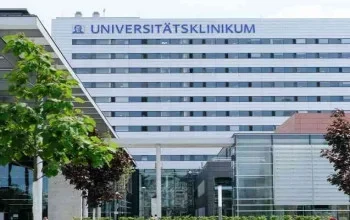
Rating : 10/10 (⭐⭐⭐⭐⭐) Treatment Cost: Up to 12.000€
Prof. Dr. med. Thomas Vogl is one of the top medical practitioners in the whole of Germany in 2022.
The award criteria include a leading position in a clinic or medical institution, recommendations from colleagues,
recommendations from patients, experience, scientific commitment and much more.
🔹Univ.-Prof. Dr. Dr. med. Thomas J. Vogl's in Frankfurt am main, illustrious career in the medical field spans several decades, showcasing his dedication to both education and medical research. His journey began with his undergraduate studies in Human Medicine at Ludwig-Maximilians-Universität in München from 1976 to 1982. In 1980, he also had the opportunity to study at the Hebrew University School of Medicine at Hadassah Hospital in Jerusalem. During his academic years, from 1980 to 1981, he worked as a Co-Assistent at the Anatomischen Anstalt of the University München.
🔹Upon completing his studies, he obtained his medical license in 1982. Dr. Vogl's academic accomplishments continued as he earned his doctorate (Dr. med.) in 1983 with a dissertation titled "Bestimmung des Mineralsalzgehalts am peripheren Skelett mit Hilfe der 125-Jod-Gammastrahlenabsorption bei Patienten mit Diabetes mellitus," which was awarded the highest distinction, "magna cum laude."
🔹His professional journey began in 1983 when he joined the Radiologische Klinik of the University München under the directorship of Prof. Dr. med. Dr. h.c. J. Lissner. Throughout his career, Dr. Vogl undertook various academic and professional pursuits. He conducted research at the Massachusetts General Hospital in Boston under the guidance of Prof. Dr. Juan Taveras in 1988.
🔹From October 1988 to March 1990, he pursued further training in Nuklearmedizin, and in 1989, he was recognized as a physician specialized in Radiology with expertise in Strahlentherapie. His academic achievements continued with the completion of his Habilitation and the conferment of the title "Dr. med. habil." on July 18, 1990.
🔹Dr. Vogl's career progressed as he assumed the role of Oberarzt at the Radiologische Klinik of the University München in 1990. He further expanded his expertise by obtaining the Fachkunde Nuklearmedizin in 1992 and the Fachkunde "Nuklearmedizinische invitro-Diagnostik" from March to May 1992.
🔹In 1993, he was appointed Leitender Oberarzt of the Strahlenklinik und Poliklinik at the Freien Universität Berlin, Universitätsklinikum Rudolf Virchow under the directorship of Prof. Dr. Dr. h.c. R. Felix. His primary areas of focus included conventional Röntgendiagnostik, Traumatologie, Gastrointestinale Radiologie, and interventionelle Radiologie (Chemoembolisation, Angioplastie), as well as Magnetresonanztomographie. His research interests encompassed MR Angiographie, in-vivo-Spektroskopie, Kontrastmittelentwicklung, interstitielle Lasertherapie, and hepatobiliäre Diagnostik.
🔹On December 23, 1993, Dr. Vogl was appointed to the C3 Professur für Allgemeine Radiologie by the Freie Universität Berlin. His recognition as a Radiologe by the Ärztekammer Berlin, granting him the right to use the title "Arzt für Radiologische Diagnostik," occurred on January 13, 1994. His expertise in the field was further demonstrated with his recognition as a physician specialized in Neuroradiology in 1996.
🔹In 1998, he received a prestigious offer of a C4 Professur für Röntgendiagnostik at the Goethe-Universität Frankfurt, where he assumed the role of Director of the Institut für Diagnostische und Interventionelle Radiologie at the Universitätsklinikum Frankfurt. In 2005, he expanded his responsibilities by entering into a cooperation with the Orthopädischen Klinik Stiftung Friedrichsheim of the Universität Frankfurt, where he led the Radiologie department. He also became the Deputy Medical Director of the Universitätsklinikum Frankfurt.
🔹Dr. Vogl's extensive expertise in the field of medical imaging led to his appointment as a Q3-Ausbilder Herz-MRT and Herz-CT in 2011. He continued to serve in various roles, including as the Sprecher of the Frankfurter Klinikallianz and as the Leitlinienbeauftragter of the Deutschen Röntgengesellschaft in 2013. Univ.-Prof. Dr. Dr. med. Thomas J. Vogl's remarkable career is a testament to his significant contributions to the field of Radiology and his dedication to both patient care and medical research.
🔹 1976 - 1982: Studied Human Medicine at Ludwig Maximilian University in Munich.
🔹 1980: Studies at the Hebrew University School of Medicine, Hadassah Hospital, Jerusalem.
🔹 1980 - 1981: Co-assistant at the Anatomical Institute of the University of Munich.
🔹 1982: Licensed as a physician.
🔹 1983: Doctorate in Medicine (Dr. med.) with a dissertation on "Determination of the mineral salt content in the peripheral skeleton using 125-iodine gamma-ray absorption in patients with diabetes mellitus," awarded with the grade "magna cum laude."
🔹 From 1983: Assistant physician at the Radiology Clinic of the University of Munich (Director: Prof. Dr. med. Dr. h.c. J. Lissner).
Professional Career:
🔹 1988: Research stay at the Massachusetts General Hospital in Boston under the supervision of Prof. Dr. Juan Taveras.
🔹 Oct. 1, 1988 - March 31, 1990: Further training in Nuclear Medicine.
🔹 1989: Recognition as a Radiologist with expertise in Radiation Therapy.
🔹 July 18, 1990: Completion of postdoctoral qualification (Habilitation) with the award of Dr. med. habil.
🔹 1990: Senior physician at the Radiology Clinic of the University of Munich.
🔹 1992: Acquisition of expertise in Nuclear Medicine.
🔹 March - May 1992: Acquisition of expertise in "Nuclear Medicine In Vitro Diagnostics."
🔹 1993: Appointment as Senior Consultant at the Department of Radiation Medicine and Outpatient Clinic, Free University of Berlin, Rudolf Virchow University Hospital (Director: Prof. Dr. Dr. h. c. R. Felix).
🔹 Main areas of work: conventional X-ray diagnostics, traumatology, gastrointestinal radiology, interventional radiology (chemoembolization, angioplasty), magnetic resonance imaging.
🔹 Research topics: MR angiography, in vivo spectroscopy, contrast agent development, interstitial laser therapy, hepatobiliary diagnostics.
🔹 Dec. 23, 1993: Appointment to the C3 Professorship for General Radiology by the Free University of Berlin.
🔹 Jan. 13, 1994: Recognition as a Radiologist by the Berlin Medical Association, authorization to use the designation "Physician for Radiological Diagnostics."
🔹 1996: Recognition as a Physician for Neuroradiology.
🔹 1998: Offered the C4 Professorship for Radiological Diagnostics at Goethe University Frankfurt.
🔹 1998: Director of the Institute for Diagnostic and Interventional Radiology at the University Hospital Frankfurt.
🔹 2005: Collaboration with the Orthopedic Clinic Friedrichsheim Foundation of the University of Frankfurt, heading the Radiology department.
🔹 2005: Deputy Medical Director of the University Hospital Frankfurt.
🔹 2011: Q3 Trainer for Cardiac MRI and Cardiac CT.
🔹 2013: Spokesperson for the Frankfurt Clinic Alliance; Guidelines Commissioner of the German Radiological Society.
🔹Abdominal and thoracic diagnostics and intervention in Germany
🔹Interventional MR (Magnetic Resonance) imaging in Germany
🔹Subproject Leader of the Special Research Area "Hyperthermia" SFB 1470
🔹Digital and three-dimensional imaging techniques
🔹MR spectroscopy and MR angiography
🔹Novel techniques for endoluminal magnetic resonance imaging
🔹Imaging diagnostics in the skull base, craniofacial, and neck region
🔹Multidetector computed tomography
🔹Mammographic diagnostics
🔹Intervention and laser-assisted vascular ablations
🔹Treatment and Diagnostic:
🔹Pancreatic tumors (pancreatic cancer) treatment in Germany
🔹Liver tumors (hepatic tumors) treatment in Germany
🔹Uterine fibroids (uterus myomas) treatment in Germany
🔹Adenomyosis of the uterus treatment in Germany
🔹Bone tumor treatment in Germany
🔹Fibroadenomas of the breast treatment in Germany
🔹Breast cancer (mammacarcinomas) treatment in Germany
🔹Kidney Cancer treatment in Germany
🔹Diagnostic radiology care in Germany
They utilize magnetic resonance imaging (MRI) techniques, including:
🔹Whole-body MRI in Germany
🔹Molecular MRI in Germany
🔹Multiparametric MRI (for prostate and breast)
🔹Brain MRI in Germany
🔹Spinal MRI in Germany
🔹Joint diagnostics in Germany
🔹Cardiovascular MRI in Germany
Additionally, they perform diagnostic procedures using computed tomography (CT) for various conditions, such as:
🔹Heart CT
🔹Virtual colonography
🔹Virtual endoscopy
🔹X-ray diagnostics
🔹Ultrasound diagnostics (Sonography):
🔹Liver
🔹Spleen
🔹Pancreas
🔹Kidneys
🔹Lymph nodes
🔹Doppler examinations of the carotid artery, pelvic and leg veins, and the heart


.webp)
 (1).webp)

.webp)
 (1).webp)


.webp)
 (1).webp)

.webp)
 (1).webp)
